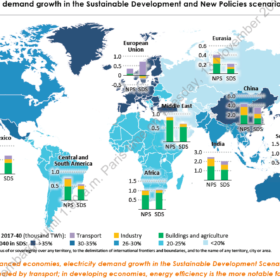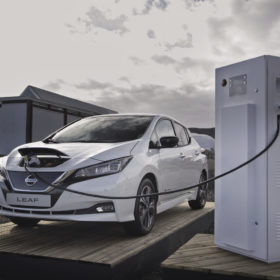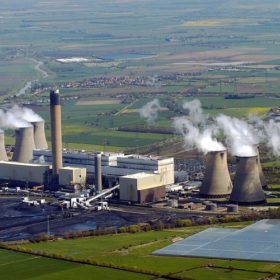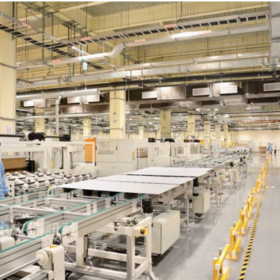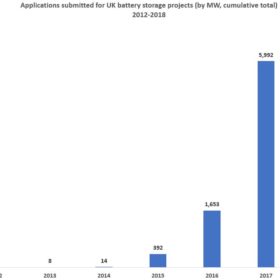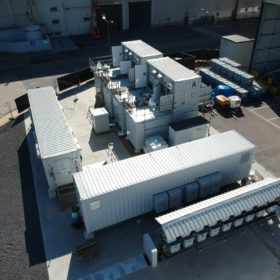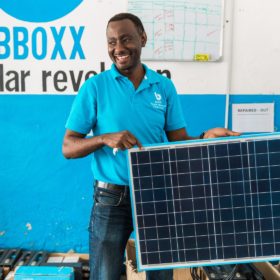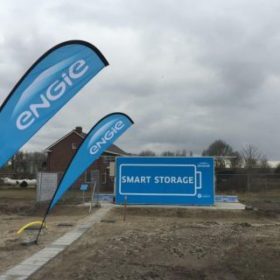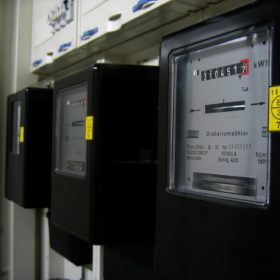IEA World Energy Outlook: Solar PV capacity to overtake all but gas by 2040
Even in its low ball scenario, the International Energy Agency (IEA) imagines that installed solar PV capacity will overtake that of all other forms of energy apart from gas by 2040. Overall, it presents four scenarios in its 2018 World Energy Outlook, which show a changing energy landscape. While it finds that CO2 levels are, perversely, on the rise, and that many energy efforts in all but the most whimsical of its forecasts are far behind those needed to seriously address global warming, it still imagines coal, oil and gas playing a leading role in our energy mix going forward. It also sees “dramatic” transformation in the electricity sector. Long story short: Read something else if you want to take real climate action. We suggest The Drawdown.
What’s in store for storage? $620bn
The rise of batteries will attract that headline figure in investment up to 2040, say analysts, as exponential growth in EV ownership, falling stationery system costs and the needs of the world’s grid-poor regions combine to boost lithium-ion technology.
Renewables overtake fossil fuels in UK installed capacity
A report published today by U.K.-headquartered energy company Drax says that, for the first time ever, total generation capacity available from renewables has overtaken that of fossil fuels on Britain’s electric grid.
India’s 10 GW solar tender amended again – but deterrents remain
While the timelines for PV plant execution and completion of the manufacturing facilities required by the tender are now more realistic, production obligations – especially related to capacity utilization – need to be revisited.
UK storage on the fly with 6.9 GW cumulative pipeline
At an event in London, a new tool was presented which lets the user track the UK storage landscape. The market is gaining traction amidst disfavourable policies for solar PV and other renewables from Westminster. The UK’s storage portfolio seems to be growing rapidly.
Europe’s largest commercial and industrial PV storage testbed launched
Testing lithium-ion, redox flow, and sodium-sulfur technologies, EPC provider CMI Energy wants to establish which types of system, or which combinations, are most suitable for different applications using the 4.2 MWh facility.
Project targets nationwide tokenization of Estonian grid through blockchain
Blockchain innovator WePower and Estonian transmission system operator Elering have partnered to tokenize the Estonian grid using an Ethereum blockchain. The project is pilot, but its initiators say it could provide tangible data for bringing the technology to markets worldwide.
EDF takes 50% stake in BBOXX Togo
French energy giant EDF has acquired a 50% stake in off-grid developer BBOXX’s operation in Togo. The two will work together to boost access to electricity in the West African country, according to EDF, and the partnership is the first step, with plans to extend cooperation to more countries in Africa.
Engie launches second-life EV battery grid services
With a proof of concept, Engie and Connected Power have integrated their second-life EV storage system into the distribution system of TenneT in Rotterdam, the Netherlands.
Energy industry raises concerns over EU data protection ambitions
In an open letter to the European Council, energy industry representatives have criticized EU legislation, which only considers cookies from websites and apps, but neglects the energy industry. Smart energy management businesses could run into serious complications if the EU prevents them from processing data from EV, gensets, and batteries, they argue.
